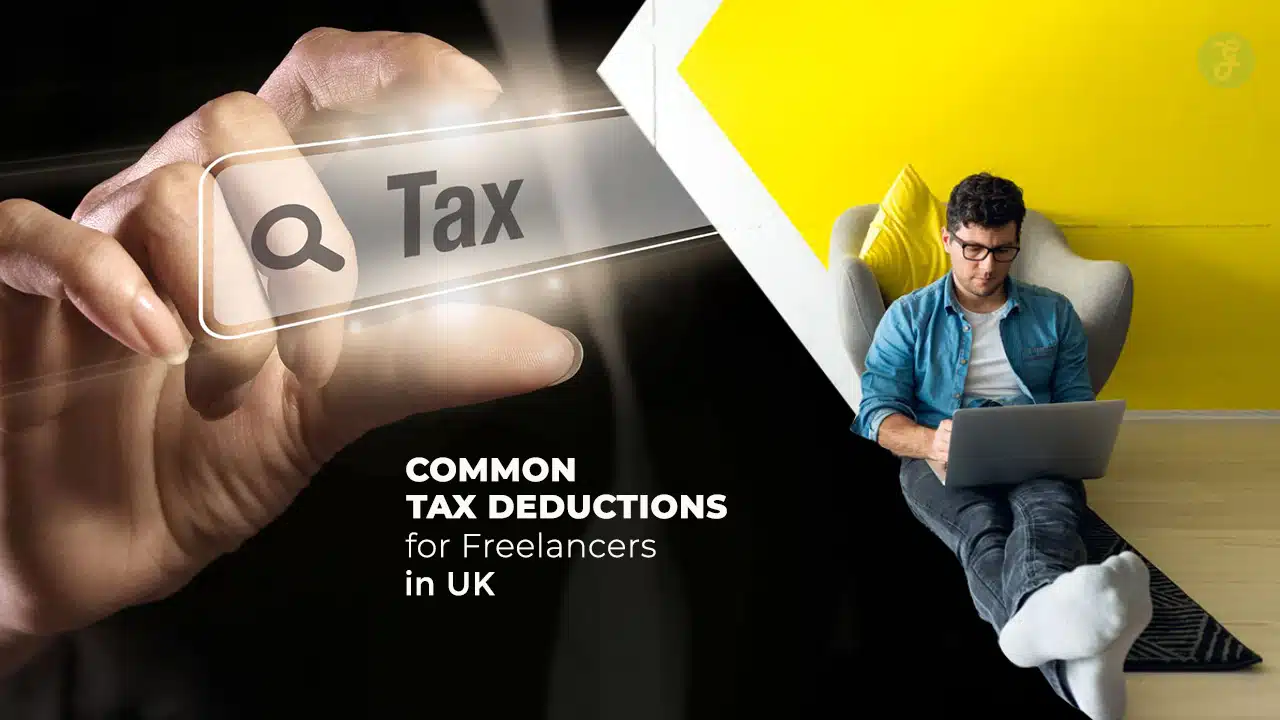Freelancing in the UK offers flexibility, independence, and the opportunity to grow a personal business. However, one major challenge that freelancers face is managing their taxes efficiently.
Understanding common tax deductions for freelancers in UK can significantly reduce taxable income and increase overall earnings.
As a freelancer, you are responsible for handling your finances, including filing your taxes correctly and claiming allowable expenses. HMRC provides specific guidelines on what expenses you can deduct from your taxable income, but many freelancers either over-claim or underutilize these deductions.
In this guide, we will explore the 10 most common tax deductions for freelancers in UK, helping you keep more of your hard-earned money while staying compliant with tax regulations.
Understanding Tax Deductions for Freelancers
Tax deductions, also known as allowable business expenses, are costs incurred for the purpose of running a business that can be deducted from income before calculating tax liability. For freelancers, these deductions help reduce the amount of taxable income, ultimately lowering the tax owed.
Knowing which deductions apply to your business can make a significant impact on your net earnings.
Who Qualifies for Freelancer Tax Deductions in the UK?
Freelancers, self-employed individuals, and sole traders can claim tax deductions, provided the expenses are “wholly and exclusively” for business purposes. HMRC has strict rules on what qualifies as a deductible expense, making it essential to keep detailed records of all business-related costs.
If an expense is used both for business and personal reasons, only the business portion can be deducted.
10 Common Tax Deductions for Freelancers in UK
Freelancers in the UK can significantly reduce their tax burden by claiming various deductions that apply specifically to their business activities. Knowing what expenses qualify can make a substantial difference in your overall tax savings and financial health.
By strategically utilizing these tax deductions, you ensure compliance with HMRC guidelines while maximizing profits.
1. Home Office Expenses
Many freelancers work from home, making home office expenses one of the most valuable deductions. You can claim a portion of household costs such as:
- Rent or mortgage interest
- Utility bills (electricity, water, heating)
- Council tax
- Internet and phone bills
- Property repairs related to the workspace
Table: Home Office Deduction Methods
| Method | How It Works | Who Should Use It? |
| Flat Rate | HMRC fixed amount based on work hours | Freelancers with minimal home office use |
| Actual Cost | Claim exact business-related expenses | Freelancers with a dedicated workspace |
How to Claim:
- Flat Rate Method: HMRC offers a simplified method where you claim a fixed amount based on the hours you work from home per month.
- Actual Cost Method: Calculate the percentage of home use dedicated to your business and apply that percentage to your household bills.
- Example: If your home office takes up 10% of your house, you can claim 10% of your rent and utility bills as business expenses.
2. Office Supplies and Equipment
Freelancers frequently require office supplies and equipment for work. Common deductible items include:
- Computers, laptops, and printers
- Desks and office chairs
- Notebooks, pens, and paper
- Software and subscriptions (e.g., Microsoft Office, Adobe Suite)
Table: Deductible Office Supplies
| Item | Deduction Type | Notes |
| Laptop | Capital Allowance | Claim over multiple years if expensive |
| Stationery | Business Expense | Fully deductible |
| Desk & Chair | Capital Allowance | Claim as an asset |
3. Internet and Phone Bills
If you use your personal phone and internet for business purposes, you can deduct a portion of these expenses. However, if you have a separate business phone line, you can claim the full cost.
Tip:
- Keep a record of business vs. personal use to justify your claim in case of an HMRC audit.
- Use business phone plans to simplify deductions.
- Example: If 60% of your phone usage is for business, you can deduct 60% of your monthly bill.
4. Travel and Mileage Costs
Business-related travel expenses are fully deductible, including:
- Public transport costs (trains, buses, taxis)
- Airfare and accommodation for work-related trips
- Mileage if you use your personal vehicle for business (45p per mile for the first 10,000 miles, then 25p per mile)
- Parking fees and tolls
Table: Mileage Allowance
| Vehicle Type | Rate per Mile (First 10,000 miles) | Rate per Mile (After 10,000 miles) |
| Car/Van | 45p | 25p |
| Motorcycle | 24p | 24p |
5. Professional Services and Subcontracting
Freelancers often outsource work or seek professional assistance. Deductible costs include:
- Accountant or bookkeeper fees
- Legal consultation fees
- Payments to subcontractors or virtual assistants
- Business coaching
Example: A freelance graphic designer outsourcing web development work can claim payments to a subcontractor as a business expense.
6. Training and Professional Development
Courses, training, and certifications that enhance your business skills can be deducted, provided they relate directly to your current trade.
Examples include:
- Online courses for upskilling (e.g., Udemy, Coursera)
- Business coaching sessions
- Industry workshops and seminars
7. Marketing and Advertising Costs
Promoting your freelance business is crucial, and related expenses are deductible. These include:
- Website development and hosting fees
- Google Ads and social media promotions
- Business cards and branding materials
- SEO tools and analytics software
Example: A freelance writer investing in Google Ads to attract clients can deduct the ad spend from taxable income.
8. Software and Subscriptions
Many freelancers rely on software tools for their work. You can claim expenses for:
- Cloud storage (Dropbox, Google Drive)
- Graphic design tools (Canva, Photoshop)
- Project management software (Trello, Asana)
- Domain names and business emails
9. Business Insurance
Having insurance protects freelancers from potential legal and financial risks. Common deductible insurance types include:
- Professional indemnity insurance
- Public liability insurance
- Equipment insurance
10. Pension Contributions
Self-employed individuals can claim tax relief on pension contributions. Contributing to a personal pension plan reduces taxable income and secures financial stability for the future.
Example: A freelancer contributing £200 per month to a pension plan can claim tax relief on those contributions.
Takeaways
Understanding and claiming common tax deductions for freelancers in UK is essential for reducing tax liability and increasing take-home income. By keeping detailed records and knowing what expenses qualify, freelancers can legally and effectively lower their tax burden.
Whether you’re working from home, investing in professional development, or outsourcing services, leveraging these tax deductions can make a significant difference in your financial success. Always ensure compliance with HMRC regulations and consider consulting a tax professional for tailored advice.
Start tracking your expenses today to maximize your freelancer tax savings!









































